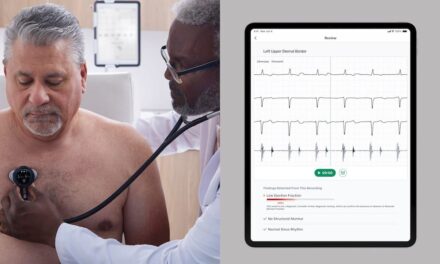Summary: Prolocor announced the publication of positive results from its 800-patient trial, confirming that its pFCG test effectively predicts the risk of thrombotic events in patients with acute coronary syndrome (ACS).
Takeaways:
- The Prolocor pFCG test identifies ACS patients at higher risk for heart attack, stroke, and death by quantifying FcγRIIa expression on platelets.
- The study found that patients with a high pFCG test score had more than double the risk of thrombotic events compared to low-risk patients.
- The test has been studied in nearly 1,000 patients, with consistent results, and could help clinicians tailor antiplatelet therapy to improve patient outcomes.
Prolocor, a healthcare startup developing the innovative diagnostic Prolocor pFCG test that identifies patients at higher and lower risk of thrombotic events (heart attack, stroke, and death), announced the publication of results from the confirmatory 800-patient ACS trial titled: FcγRIIa: A Marker of Cardiovascular Risk after Myocardial Infarction in the prestigious Journal of the American College of Cardiology (JACC). The trial was conducted in 25 sites across the United States.
“I would like to thank the investigators and patients for their participation in this important study,” says David Schneider, MD, FACC, FAHA, Prolocor co-founder and chief scientific officer. “The Prolocor pFCG test is poised to become a critical tool for clinical decision making in ACS patients.”
Assessing the Test for Acute Coronary Syndrome (ACS) Patients
The trial was a prospective, multicenter non-interventional cohort study. The primary objective of the study was to determine whether the Prolocor pFCG test, which quantifies the expression of FcγRIIa on the platelet surface, predicts risk of heart attack, stroke, and death. Patients with a high pFCG had a significantly higher risk of an event than those in the low-risk group a hazard ratio of 2.09 (1.34-3.26;) p = 0.001.
“We need tools to enable better risk stratification and treatment of ACS patients,” says Deepak L. Bhatt, MD, MPH, the director of Mount Sinai Fuster Heart Hospital and the Dr. Valentin Fuster Professor of Cardiovascular Medicine at the Icahn School of Medicine at Mount Sinai. “A simple blood test that assists in decisions regarding intensity and duration of antiplatelet therapy would be extremely useful if it subsequently leads to better patient outcomes.”
“We have now studied Prolocor pFCG in nearly 1,000 ACS patients, with consistent results,” says Prolocor CEO and Co-founder Pete DiBattiste, MD. “We at Prolocor understand the challenges clinicians face in treating this patient population and are working closely with our cardiology colleagues to provide them with this additional tool to support their clinical decision.”





